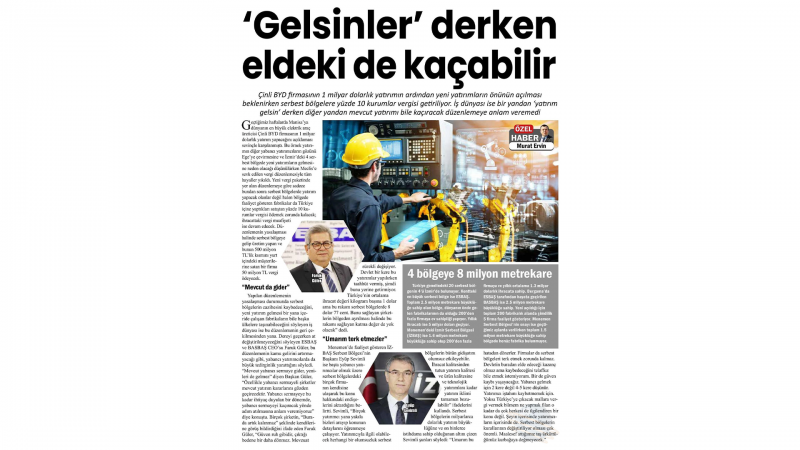
4 regions, 8 million square meters: Out of the 20 free zones in Turkey, 4 are located in İzmir. The largest free zone in the city is ESBAŞ, which spans a total area of 2.5 million square meters and hosts over 200 companies, including some of the world's leading factories. Its annual exports exceed 5 billion dollars. The İzmir Free Zone (İZBAŞ) in Menemen covers an area of 1.6 million square meters, hosting over 200 companies with an annual average export value of 1.3 billion dollars. BASBAŞ, developed by ESBAŞ in Bergama, covers an area of 2.5 million square meters and currently has 5 companies operating in the newly opened area, which is planned to accommodate a total of 200 factories. The Menemen Free Zone was approved recently, but no factories are yet established in the 1.5 million square meter area.
While new investments are expected following the 1 billion dollar investment by the Chinese company BYD, a 10% corporate tax is being introduced for free zones. The business community is puzzled by this regulation, which they fear will drive away existing investments, even as they call for more investments. Recently, it was announced with great excitement that the world's largest electric vehicle manufacturer, the Chinese company BYD, would invest 1 billion dollars in Manisa. This exemplary investment was expected to attract the attention of other foreign investors to the Aegean region and bring new investments to the four free zones in İzmir. However, the tax regulation submitted to the Parliament shattered all these hopes. According to the new tax package, not only new investors in free zones but also currently operating factories will have to pay a 10% corporate tax on their sales within Turkey; however, the tax exemption on exports will continue.
If the regulation becomes law, a company producing in a free zone and selling goods worth 500 million TL to domestic customers will have to pay 50 million TL in taxes.
"Existing Investments Might Leave"
The business community is advocating for the withdrawal of this regulation, stating that if it becomes law, the attractiveness of free zones will be lost, and even the existing factories might relocate to other countries. ESBAŞ and BASBAŞ CEO Faruk Güler stated that the regulation would not only fail to increase public revenue but also create significant anxiety among foreign investors. "Existing foreign capital will leave, and new investments will not come," said Chairman Güler, adding, "Especially foreign-invested companies will review their investment decisions. We cannot understand why steps are being taken to drive away foreign capital at a time when it is so much needed."
Faruk Güler also mentioned that many companies have expressed concerns to them, saying, "It is no longer feasible to stay here." He emphasized, "Confidence is like a soul; once it leaves a body, it doesn't return. The regulations are constantly changing. The state had given commitments when these investments were made, and now it is not fulfilling them. Turkey's average export value per kilogram is 1 dollar, but in free zones, this figure is 8 dollars and 77 cents. If the companies that achieve this leave the region, the added value they create will also be lost."
"I Hope They Don't Leave"
Eyüp Sevimli, Chairman of the İZBAŞ Free Zone in Menemen, mentioned that many companies, especially foreign investors, have contacted him to express their concerns about this issue. Sevimli said, "Many investors are desperately calling us to learn the details of the issue. Any negativity that might affect the investors could negatively impact the overall trajectory of the free zones. The investment climate, from the quality of exports to the quality of investments and products, and technological investments, could be entirely disrupted."
Sevimli highlighted that free zones have billions of dollars in investment volume and tens of thousands of jobs, stating, "I hope they reverse this mistake.
I hope companies don't have to leave the free zones. The state won't gain from this, but I don't even want to mention what it could lose. We will also experience a loss of trust. Foreign investors will think four or five times before coming. It's not about the tax on goods exported to Turkey or anything like that; it's about changing the rules of free zones, which is very important. Unfortunately, the stone we throw won't be worth the frog we scare."
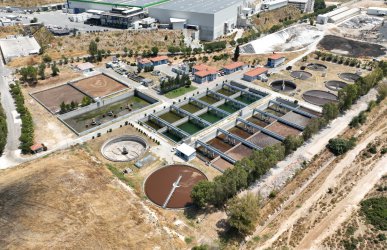
Gürsel Bahçıvancılar, the General Manager of İZBAŞ İzmir Free Zone Founding and Operating Company, responded in detail t..
Read More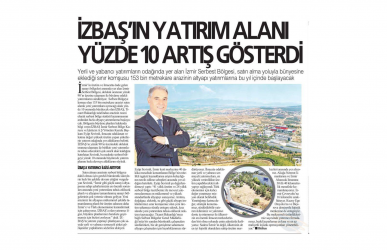
Izmir Free Zone, one of the leading industrial regions in Izmir for production and exports, continues its growth-focused..
Read More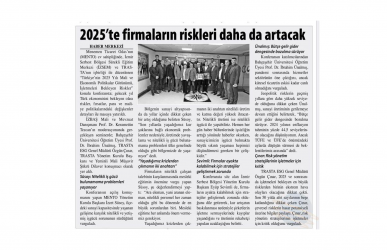
At the conference titled “Turkey's Financial and Economic Policy Outlook for 2025, Risks Awaiting Businesses” hosted by ..
Read More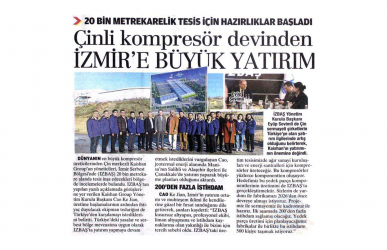
The senior executives of China-based Kaishan Group, one of the world’s largest compressor manufacturers operating in 28 ..
Read More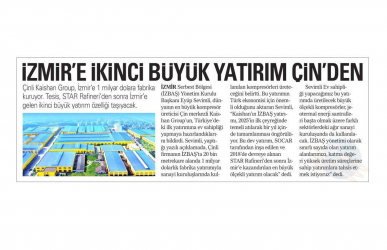
One of İzmir’s most significant production and export hubs, İzmir Free Zone (İZBAŞ), is set to host the first investment..
Read More
The Board of Directors of İzmir Free Zone Founder and Operator Inc. (İZBAŞ) visited Mr. Aydın Pehlivan, the Mayor of Men..
Read More
The Board of Directors of the İzmir Free Zone (İZBAŞ), one of the most significant investment addresses in İzmir for bot..
Read More
Izmir Free Zone (IZBAŞ), which hosts 205 local and foreign-invested companies and over 6,000 employees, aims to become t..
Read More
Founded in 1984 under the name of Leather Industrialists Building Cooperative, İzmir Free Zone has become one of Turkey'..
Read MoreİZBAŞ's professional team is ready to give you all the information you need to invest in İzmir Free Zone.
Click here to fill in the formİZBAŞ İZMİR SERBEST BÖLGE KURUCU VE İŞLETİCİ A. Ş. © 2022 | ALL RIGHTS RESERVED.